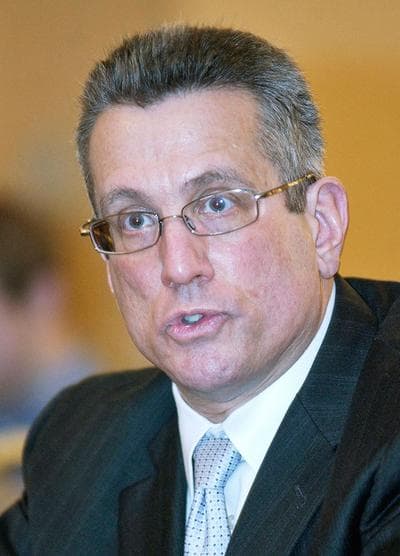Advertisement
Education Commissioner: You Can't Divorce Test Scores And Teacher Effectiveness
To wrap up our week-long series, "Making an A+ Teacher," WBUR's All Things Considered host Sacha Pfeiffer spoke with Massachusetts Education Commissioner Mitchell Chester about a range of issues, including proposed new teacher evaluations and whether they should be linked to student test scores.

I want to get your perspective on whether great teachers are born or made. Is it nature or is it nurture?
Mitchell Chester: There's no question that great teachers work very hard at their craft. They don't start out being great teachers. There are folks who 10 years, 15 years into their careers are performing at much higher levels than when they first started out, and that's because they have a hunger for doing as well as they can. And they're always looking for ways to go the extra mile and reach those students they are struggling to reach.
Your proposals to measure whether a teacher is good or effective include using student learning as a key way of evaluating teachers. "Student learning" generally means test scores, such as MCAS. How much do you think student test scores be used to evaluate teachers?
What the MCAS does for Massachusetts is provide a common barometer, common across the state, and allow us to look at how much growth a students makes each year. And that's a valuable insight into which of our teachers are really securing strong learning gains and which of our teachers are securing weak learning gains. It's a kind of barometer we can't get from any of the other measures that we look at.
Now, having said that, I do think it's important that we supplement the MCAS to look at other measures of student learning, and that could include tests that school districts give, that can include end-of-course exams that teachers develop. So I don't think MCAS in and of itself should be the only measure that we look at. But it is the only measure we have that will give our teachers and administrators a sense of how the year-to-year progression of students compares to what we're seeing across the state.
You made a reference to "supplementing MCAS," which gives me the impression that you think that MCAS should be a central way of evaluating teachers. If you had to put a percentage on how much of a teacher's evaluation score should be linked to MCAS results — if there were such a score — what would that percentage be?
I've avoided using a percentage weight, which is a popular way to approach the topic of test scores and teacher evaluation. For me, it's a matter of cross-referencing the various measures of student learning that we have.
There are many teachers, as you certainly know, who say the MCAS was never designed to measure teacher effectiveness. Do you think that's a fair point?
I actually have problems with that statement. I've heard people say that the MCAS is designed to measure student learning but not teacher effectiveness. It seems to me that the ultimate measure of the effectiveness of instruction is how well students are learning. And so I have trouble divorcing measures of student learning from measures of instructional effectiveness.
The Board of Education votes on proposed new regulations for teacher evaluations at the end of June. It could then take as long as three years to put them in place. Does that mean that in three years we'll be significantly closer to having an A+ teacher in just about every classroom in the state?
This is a very high-leverage initiative and three years from now we will be in a much better place in Massachusetts than we are now. Now, I want to make it clear that, for Massachusetts, we've got a lot to be proud of in terms of our educational system. So our challenge is not going from bad to good; it's going from good to great. And that's what this initiative is about.
This program aired on May 27, 2011.
